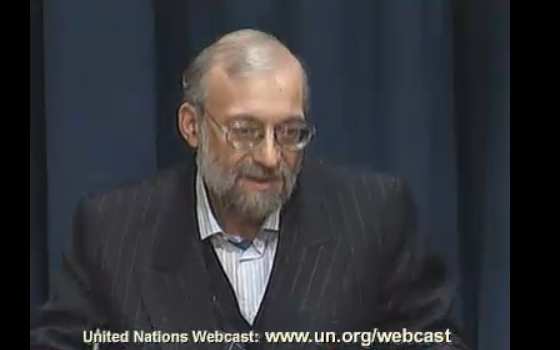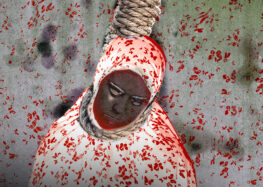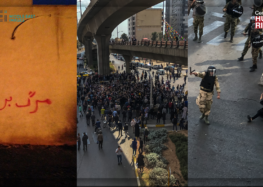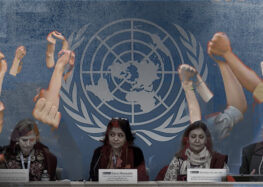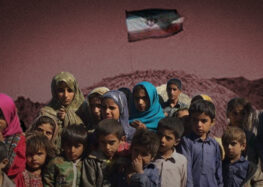Officials Should Stop Denying the Existence of Political Prisoners
(July 12, 2012) Iranian officials should cease spreading lies and disinformation about the existence of political prisoners as they are simultaneously imprisoning hundreds for exercising their legal rights, the International Campaign for Human Rights in Iran said today. The Judiciary should also immediately release all political prisoners and stop imprisoning individuals for expressing their political beliefs, the Campaign added.
On July 8, 2012, head of Iran’s High Council for Human Rights Javad Larijani publicly denied the existence of political prisoners in Iran. “A political prisoner is someone who has been politically active within the framework of the laws, but he has been unjustly imprisoned because the rulers and state authorities did not like what he was doing. According to this definition, there are no political prisoners inside the Islamic Republic of Iran,” he said in an interview with ISNA (Iranian Student News Agency).
Despite Larijani’s remark, Iran currently imprisons hundreds of people on politically motivated charges.
“What kind of prisoner would an individual whose crime is ‘acting against national security’ or ‘propaganda against the regime’ be?” Taghi Rahmani, husband of imprisoned human rights activist Narges Mohammadi, asked the Campaign rhetorically in response to Larijani’s comment.
“Larijani has an infamous record of disinformation and outright lies,” said Hadi Ghaemi, spokesperson for the Campaign. “His latest uttering adds insult to injury—it is an outrage for the hundreds of suffering political prisoners and their families,” he added.
Larijani made the denial in response to a call by Member of Parliament Ali Motahari for the Tehran Prosecutor to “end the mistreatment of political prisoners and their families.”
Larijani also denied mistreatment of any prisoners, stating, “On principle, mistreatment of prisoners, whether they are political or non-political, is condemned. Mistreatment of prisoners is against Sharia and the law.… A tone that would suggest that first of all there are political prisoners in Iran, and secondly that prison mistreatment is a usual and routine procedure, is an untrue statement and an injustice to the Iranian nation….”
In a March 2012 report based on interviews with over 140 victims and witnesses of human rights abuses in Iran, UN Special Rapporteur on human rights in Iran Ahmed Shaheed cited evidence of at least 160 Iranians imprisoned on charges including “propaganda against the regime,” “illegal assembly,” “communication with one of the opposition,” “having relations with opposing groups of the Islamic Republic,” and other political indictments. These prisoners include students and student activists, Kurdish activists, women’s rights activists, and people of the Baha’i faith.
Additionally, Iran currently imprisons the highest number of journalists in the world, according to the Committee to Protect Journalists (CPJ): “When CPJ conducted its annual prison census on December 1, 2011, Iran was holding 42 journalists in custody, the most in the world.”
Larijani has a long history of denying well-documented human rights abuses in Iran, both in the media and in international forums like the UN. For example, in an interview with CNN on February 16, 2010, he stated, “Nobody is jailed because of the [post-election] protest.” Larijani was also Iran’s deputy foreign affairs minister in 1988 when the government of Iran executed thousands of political prisoners. Responding to questions about the massacre shortly thereafter, Larijani stated, “I don’t think [the number of executions] should be that high…. First of all, we do not have that many political prisoners. They broke the country’s rules and they are in prison. The claim that we executed hundreds or even thousands of political prisoners is a lie.”
“It is high time for Larijani and his brother Sadeq Larijani, who heads the Judiciary, to be held accountable as two of the figures leading and justifying the current repression,” Ghaemi said.
In the four months since the Special Rapporteur published his report, the Campaign has spoken to dozens of Iranian political prisoners and their families, who have described in detail mistreatment, lack of basic rights, and due process violations. In separate interviews with the Campaign since Larijani’s public statement, family members of seven political prisoners responded to his assertion that “there are no political prisoners inside the Islamic Republic of Iran” as follows:
—Taghi Rahmani, husband of imprisoned human rights activist Narges Mohammadi. Mohammadi is serving a six-year sentence on charges of “assembly and collusion against national security,” “membership in the Defenders of Human Rights Center,” and “propaganda against the regime.” She has severe health problems and has been transferred to a hospital, where she has not been allowed any visitors.
—Atieh Taheri, wife of imprisoned journalist Saeed Matinpour. Matinpour is serving an eight-year sentence on charges of “relations with foreigners” and “propaganda against the regime.” He was recently held in solitary confinement for one week after attending a memorial service for another political prisoner’s death at Evin Prison
“If he takes the trouble to read the case files and visit Evin Prison and other facilities, he will find out how many political prisoners there are.”
—Parinaz Baghban Hassani, wife of imprisoned human rights activist Mohammad Sadiq Kaboudvand. Kaboudvand is serving an 11-year sentence on charges of “publishing falsehoods with the intent to create public anxiety.” He has been on hunger strike since May 25 to protest the authorities’ refusal to allow him to visit his sick child in the hospital.
—Mehdi Saharkhiz, son of imprisoned journalist and Mohammad Khatami’s former press director Issa Saharkhiz. Issa Saharkhiz is serving a five-year sentence on charges of “insulting the Supreme Leader,” “propaganda against the regime,” and “managing Akhbar-e-Eghtesadi Newspaper.” He suffers from heart disease and is kept under surveillance by security forces in the hospital.
“[Larijani’s] statement does not determine that political prisoners do not exist in society. Public opinion clarifies this issue and public opinion always calls prisoners like my wife and those like her political prisoners, and that’s that. Not just Mr. Larijani, but also no other officials who get money from the government can say whether or not there are political prisoners.”
—Reza Khandan, husband of imprisoned human rights lawyer Nasrin Sotoudeh. Sotoudeh is serving a six-year sentence on charges of “acting against national security,” “assembly and collusion against the regime,” and “membership in the Defenders of Human Rights Center.” In addition to her prison sentence, Sotoudeh has been banned from practicing law for 20 years.
“I believe Larijani’s goal was to create distraction so that he could disregard the political prisoners’ rights. … How can he say that we do not have political prisoners? When political crime is not defined in our country, this is what happens. Someone can claim that we do not have political prisoners and shrug off legal responsibility for them.”
—Marzieh Rahimi, wife of imprisoned member of the Central Council of the Islamic Revolution Mujahedin Organization Abolfazl Ghadyani. Ghadyani originally served a one-year sentence and is currently serving an additional three-year sentence on charges of “propaganda against the regime, insulting the President,” and “insulting the Supreme Leader.”
“My recommendation to Mr. Larijani is to get a new prescription for his glasses, and then to clean the lenses, so that he can see around himself a little better. … What kind of evidence and documentation can he show me and others like me to make us believe that there are no political prisoners in Iran? In a country where a lawyer like Abdolfattah Soltani has been sentenced to 18 years in prison and his wife has been threatened with imprisonment for accepting his human rights award, how can you say that there are no political prisoners?”
—Azadeh Forghani, wife of imprisoned economist and writer Fariborz Raisdana. Raisdana is serving a one-year sentence on charges of “propaganda against the regime.”

